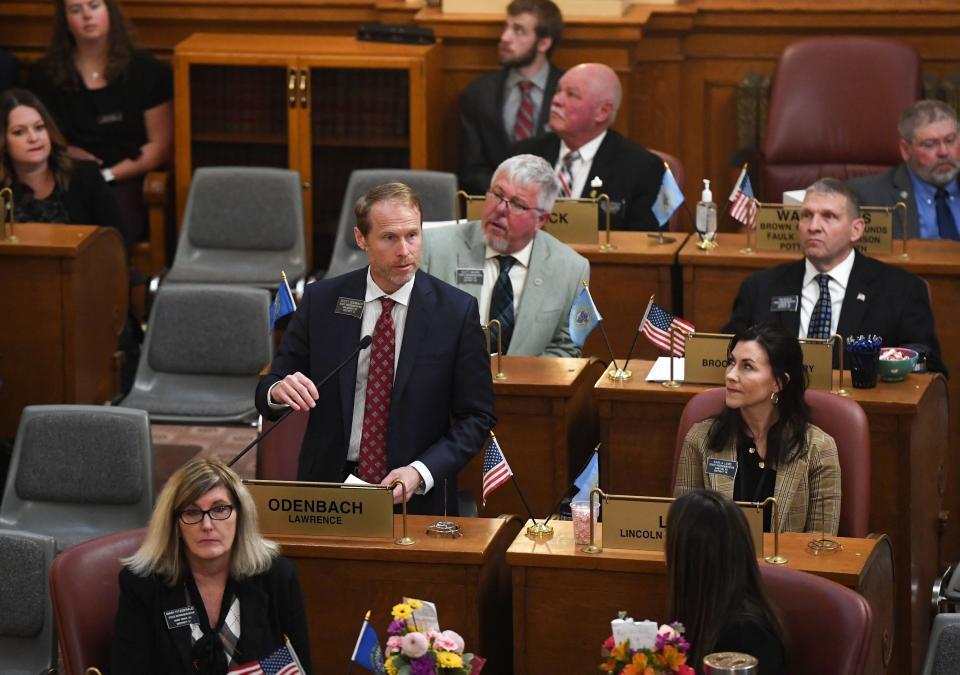Lawmakers could give Black Hills State power to create 'American exceptionalism' curriculum
- Oops!Something went wrong.Please try again later.
A bill that would create a “Center for American Exceptionalism” at Black Hills State University moved forward Monday morning in the House Education committee on a 9-6 vote.
House Bill 1070 would establish the center at BHSU for $150,000, and the center would make all six public universities partners in creating a new K-12 curriculum on “American history and exceptionalism” available to all public schools, according to the bill.
The curriculum the center creates should explain “why America rose to greatness and how to keep it that way, and (teach) students to balance critical thinking with love of country,” and include South Dakota history with an American Indian tribes component “focusing on the proud history of the Indigenous peoples of South Dakota.”
More:SD lawmakers, lobbyists seem to agree 5% funding to education is helpful, but not enough
This center would also do the following, according to the bill:
Provide multimedia content on state social studies standards;
Work with K-12 teachers and provide professional development for them to educate on history and civics topics;
Oversee the “We the People” program, and its promotion and implementation throughout public schools; and,
Develop, implement and annually update a curriculum to be taught in two courses at the state’s public colleges and universities; one comparing communist and socialist countries to Western-style democratic countries, and one comparing command-style socialist economies to free-market capitalist economies.
Rep. Scott Odenbach, a Spearfish Republican, sponsored the bill and said he had consulted with the governor’s office and BHSU President Laurie Nichols about the bill. However, noone from the governor’s office, nor the South Dakota Department of Education, the Board of Regents, or even Nichols herself were present to testify in support of the legislation Monday morning.

Two other proponents included Nicholas Drummond, an assistant professor of political science at BHSU, and Wesley Brown, a Rapid City resident, BHSU alumnus and former director of special projects for the Chiesman Center for Democracy at the University of South Dakota.
Odenbach, Drummond and Brown spoke broadly about the need for free-flowing discussion, the importance of the “We the People” program and civics curriculum, and the benefits of teaching about the love of one’s country.
Opponents of the bill included four education lobbyists, whose arguments Odenbach disparaged in his rebuttal as a “parade of horribles."
He told new legislators on the committee that "you'll be subjected to what I call the parade of horribles, from all the folks that like public school just the way it is, who never want to change one thing."
Opponents also included a representative from the Bureau of Finance and Management, who said the bill doesn’t account for ongoing funding needs.
The education lobbyists all largely argued the bill was unnecessary, in one way or another, including Rob Monson, with School Administrators of South Dakota; Dianna Miller, with the large school group; Mitch Richter, with the South Dakota United School Association; and Wade Pogany, with Associated School Boards of South Dakota
Monson said the bill neither makes current law better, nor solves a need of the state. He and Pogany said there’s already a mechanism in place to introduce curriculum, and to let local schools and districts choose their own curriculum. The Board of Regents could do this now without a bill if they chose, Monsoon added.
Miller said Odenbach should work with the Board of Education Standards or local school districts on this topic before bringing it in the form of a bill. Richter questioned why the BOR and DOE didn’t testify in support of this bill if they like it, and that introducing an individual organization like “We the People” into code isn’t generally done in this state.
Ultimately, nine members of the committee voted to move the bill to the House Appropriations committee with a recommendation that it pass, and six voted against the bill.
This article originally appeared on Sioux Falls Argus Leader: Black Hills State could create 'American exceptionalism' curriculum

